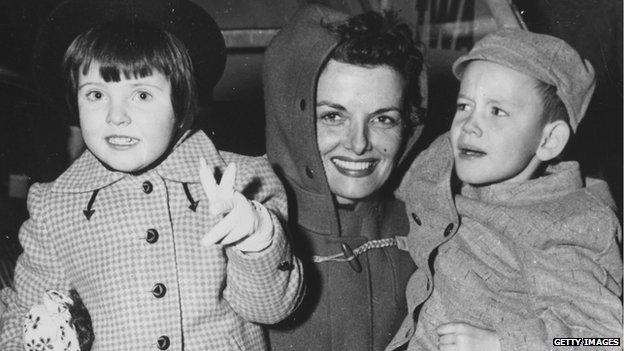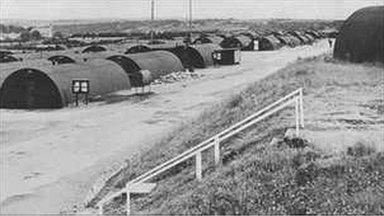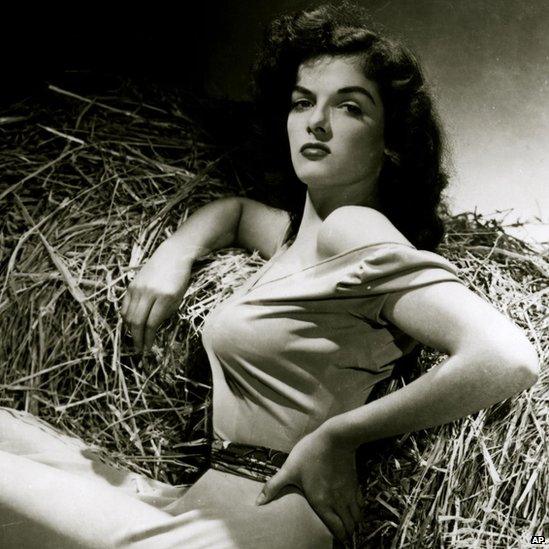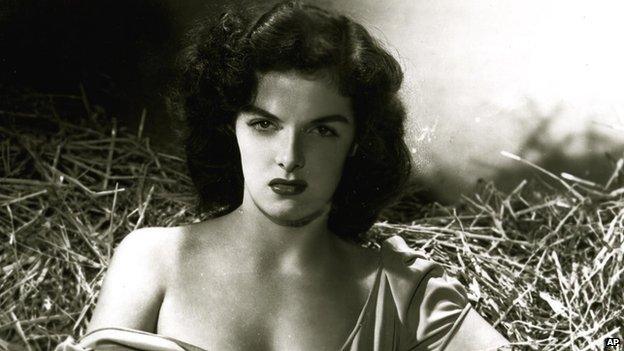From Derry rags to Hollywood riches: Jane Russell and the Springtown adoption
- Published

Because of her husband's Celtic connections, Jane Russell - pictured with with Thomas (right) and daughter Tracy - wanted to adopt an Irish boy
It is the real-life rags-to-riches story that could almost pass as a Hollywood fairytale.
One of film's most popular sex symbols in the 1940s and 1950s, Jane Russell captivated audiences in movies such as The Outlaw and Gentlemen Prefer Blondes.
But the actress sparked an international furore in 1951 when she adopted a child from a Londonderry mother living in poverty to raise as her own.
It was a move that almost ended her glittering screen career, as the scandal which followed reverberated through the law courts of London and the boulevards of Beverly Hills.
Now, in a new BBC Radio 4 documentary, broadcaster Marie-Louise Muir meets that boy, now in his 60s, as he makes an emotional first visit to Derry.
Desolation
Searching for his Irish roots, Thomas Waterfield's trip takes him to the sprawling estate where his mother Hannah McDermott lived as she grew up in the city.
Springtown Camp was a development of tin huts built for American soldiers in World War Two and which later became home to some of Derry's poorest families.

Thomas's mother Hannah grew up in Derry's Springtown Camp
News reports from the time told of the "feeling of drift and rejection" at Springtown and the "sense of desolation" there.
It was a world apart from the life steeped in glamour that Thomas went on to have, which he acknowledges was a "blessing".
While working on a stage show for the Queen in London in 1951, Russell - unable to have children of her own - told reporters of her desire to adopt a baby boy, specifically an Irish one.
Having left Derry to move to London with her family, Hannah heard the news and after making contact with Russell, the two met at the Savoy hotel.
There the switch was discussed before eventually being agreed.

Jane Russell found fame in the 1940s and 1950s as a goddess of the silver screen
After handing 15-month-old Thomas over to Russell at London Airport, Hannah fought back tears as she told the press of her heartbreak but also of her hope.
'My baby has gone to fairyland', read the headline in the Daily Mirror on 8 November 1951.
"This means a new life for him," Hannah said.
"Out there there will be chances. I've always admired Jane Russell on the pictures but I never realised she was such a real person."
Effortless
But the ad hoc adoption trigged a fierce reaction both in the United Kingdom and in Ireland.
The documentary looks in detail at the controversy surrounding it and the widely-held notion at the time that someone could pick out a baby and within days have it as their own - the "effortless acquisition" of adopting a child and taking it abroad.

Jane Russell captivated cinemagoers in movies such as The Outlaw and Gentlemen Prefer Blondes
The adoption even caused a stir in parliament, with one MP demanding Thomas's return and a strengthening of legislation on the issue.
Hannah was charged with breaching adoption laws, but with the help of a barrister hired by Russell she received a conditional discharge.
Fairytale
Back in Derry, Thomas - who now lives in Arizona - meets his uncle Sandy and a woman who grew up with Hannah.
She tells him that his biological mother gave him away because she wanted him "to do better" for himself.
"In them days, there was nothing here for you to do," she explains.
"[Your mother] didn't give you away because she didn't want you, she gave you away because she loved you."
As one of those left behind in Springtown, writer Willie Deery, who was a neighbour of Hannah's there, tells Thomas: "Your life was like a fairytale to us."
"It feels like a fairytale to me," he replies.
Jane Russell and the Springtown Mother was first broadcast on BBC Radio 4 on Friday 27 March and is available on the BBC iPlayer.
- Published19 March 2013
withdaughtertracyandthomas.jpg)